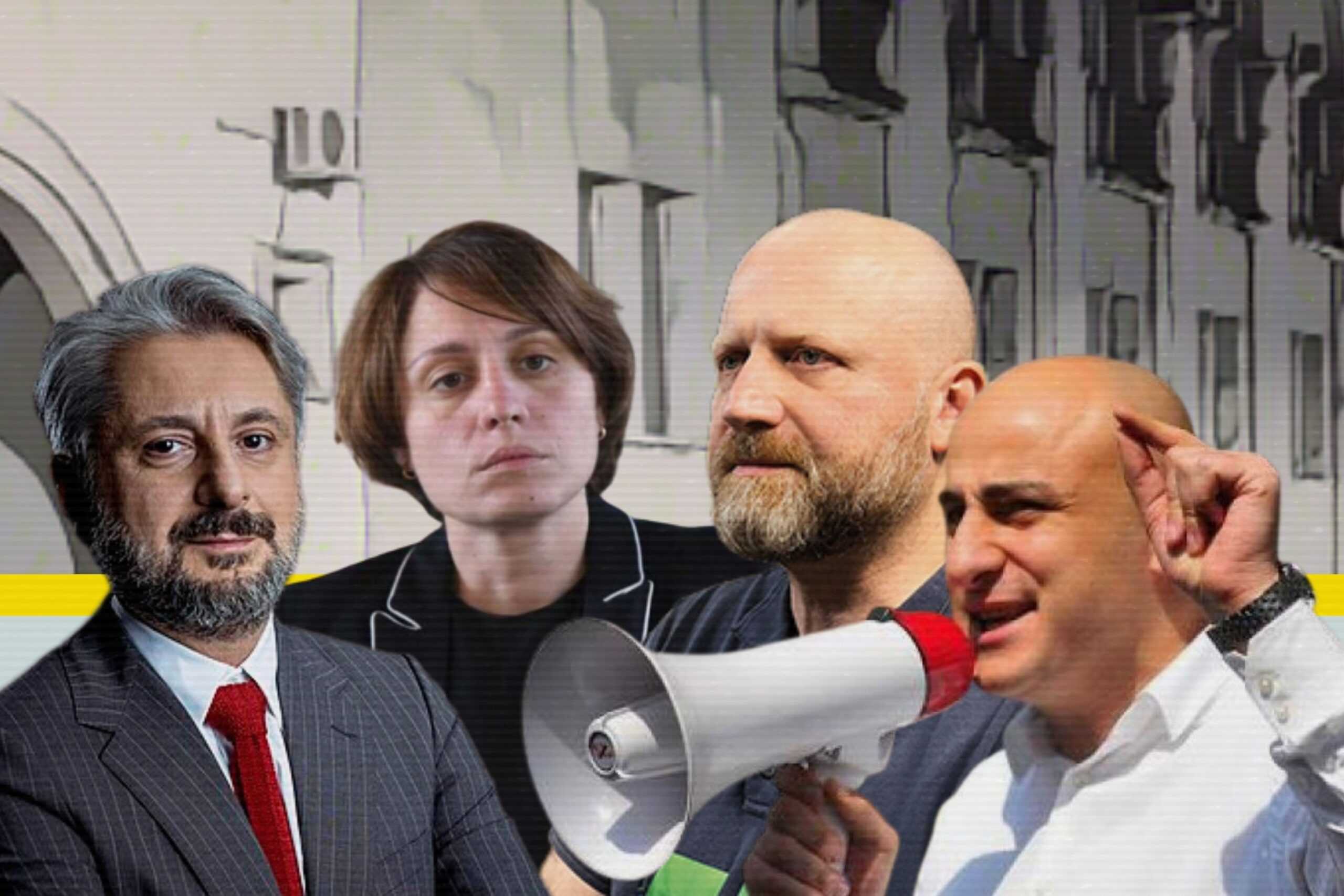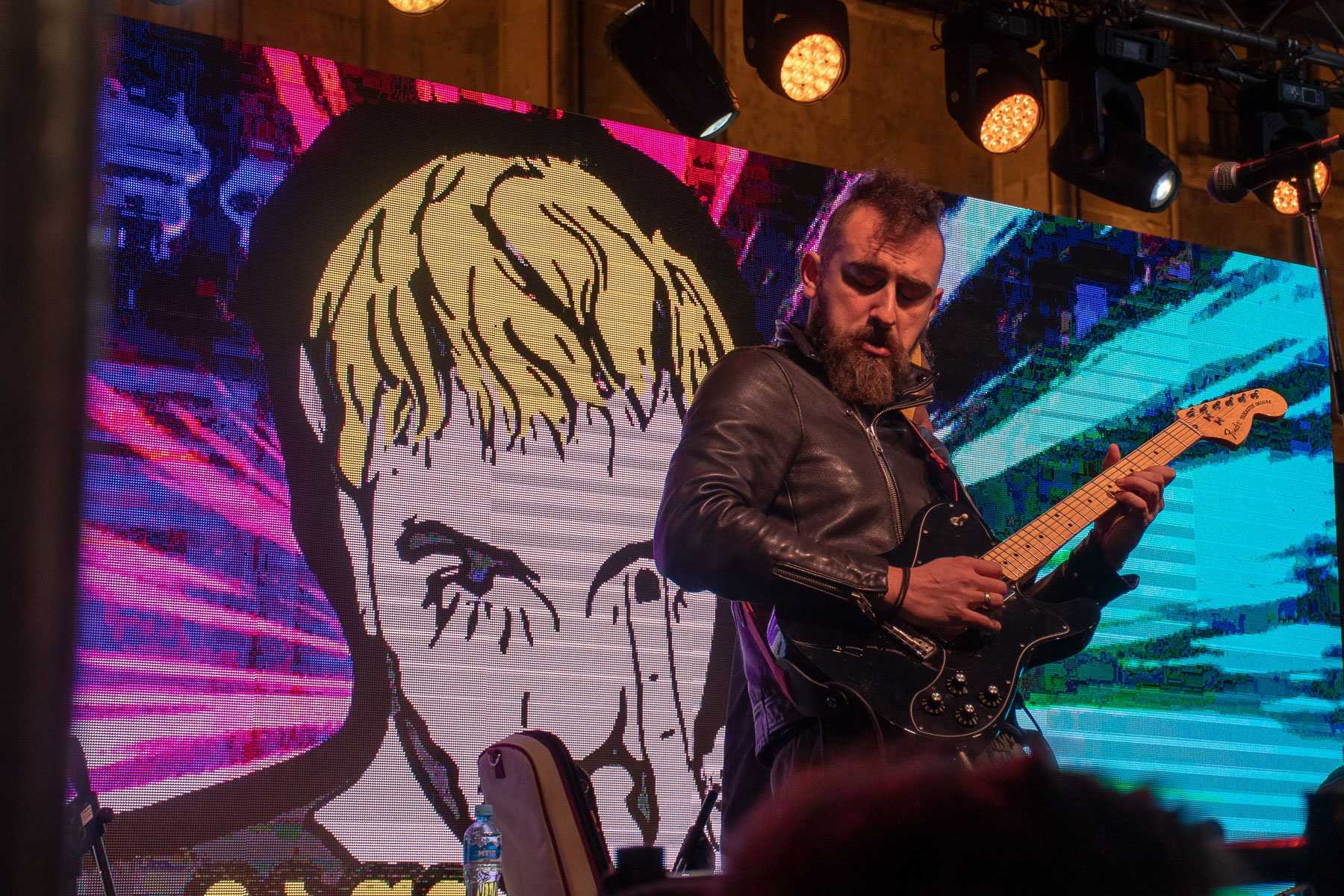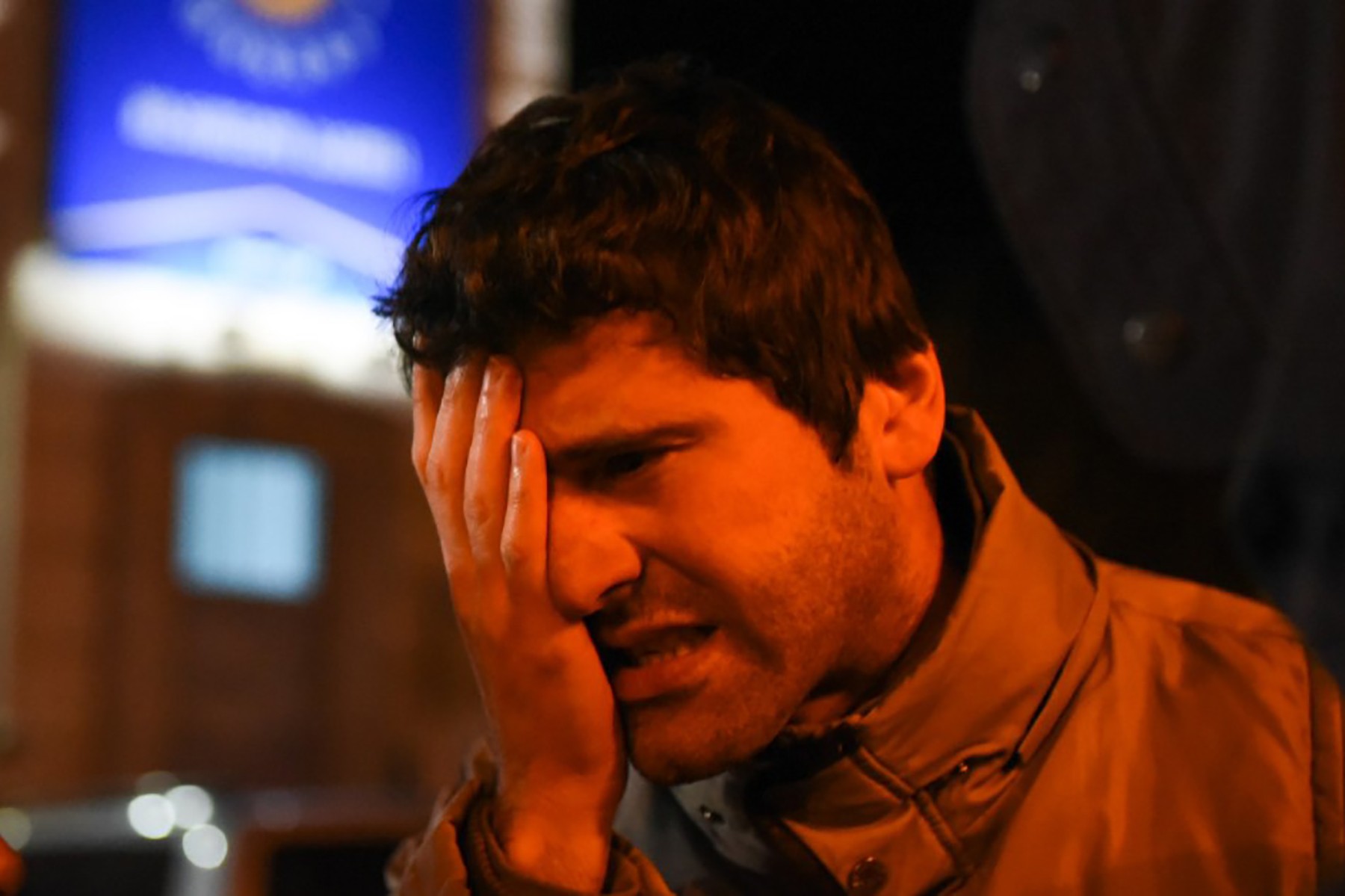
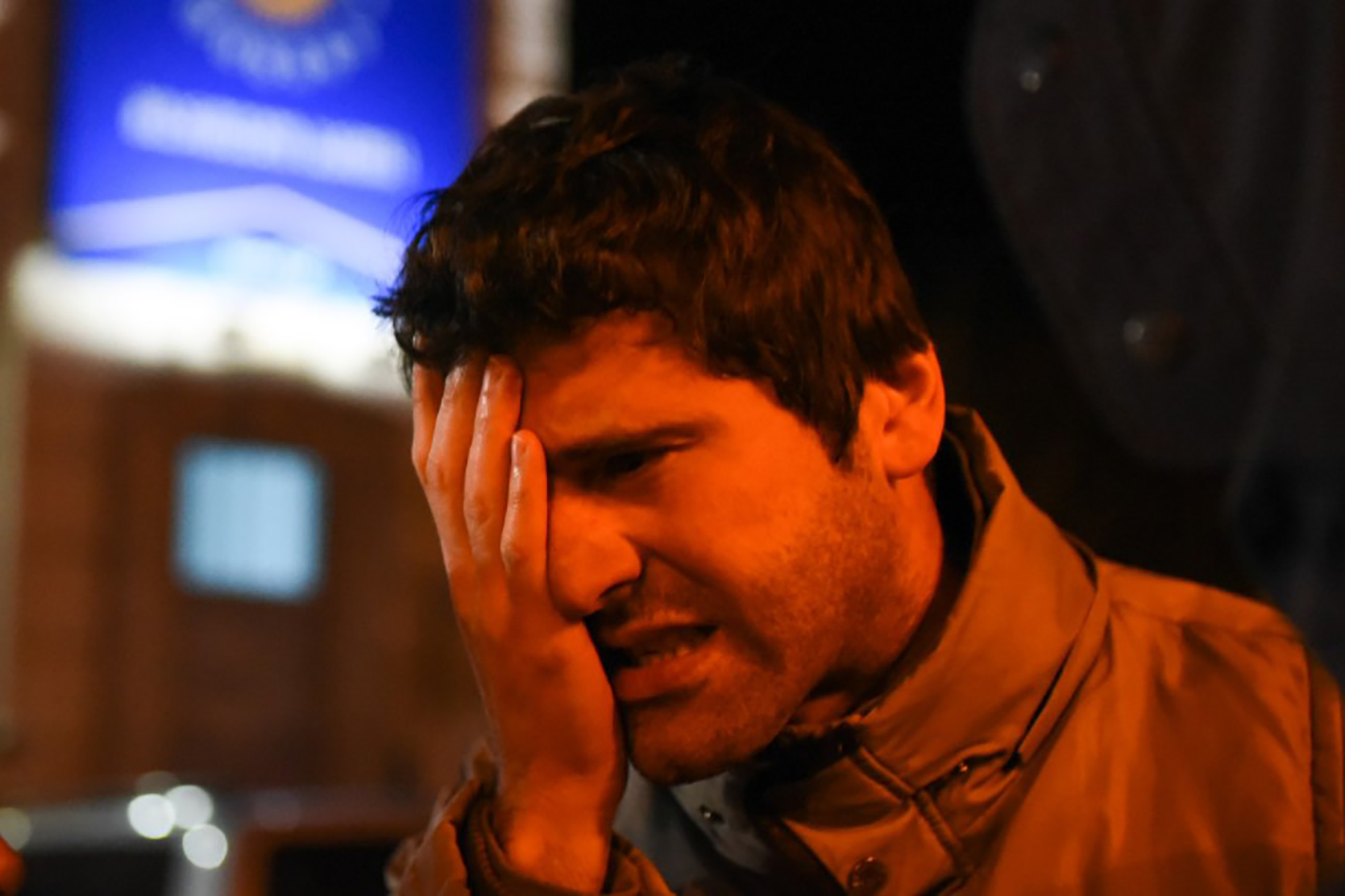
Pro-government youth groups in Georgia have attacked anti-government protesters and opposition members, with several being injured. Protesters have been attacked in Tbilisi, Kutaisi, Mtskheta, and Zugdidi since Sunday.
After breaking up larger rallies by opposition groups with riot police and preventing them from blockading parliament building with metal fences, the ruling Georgian Dream party is now being accused of resorting to violent groups to tackle their opponents.
Zaal Udumashvili, one of the leaders of the United National Movement party (UNM), was hit in the face with a broom while being interviewed live on TV during a rally in the city of Mtskheta, 25 kilometres from Tbilisi, on Tuesday. Police apprehended the alleged perpetrator for petty hooliganism and disobeying police.
Giga Bokeria one of the leaders of the opposition European Georgia party was splashed with water during the same rally.
Parliamentary groups the UNM, European Georgia and other opposition parties gathered in Mtskheta on 3 December and circled the city mayor’s office in defiance of violent groups that confronted anti-government youth activists the previous day.
Police cordoned off counter-demonstrators, supporters of Georgian Dream, but did not immediately arrest people throwing objects at the opposition.
Gigi Ugulava, another of the leaders of European Georgia, insisted the counter-demonstrators were being controlled by the government. He called them ‘cowards who dare to attack only peaceful young people’.
Pro-government groups also gathered in Kutaisi that day in an attempt to thwart an opposition meeting in preparation for the larger rally in the city.
A nation-wide mobilisation of Georgian Dream supporters against the opposition was announced in Kutaisi on 1 December, with a smaller gathering also on 29 November. On Sunday, government supporters pelted the UNM’s office in Tbilisi with eggs, bottles, firecrackers, and other objects.
A rally against the opposition, mostly targeting the formerly ruling UNM, was also organised in Zugdidi on 3 December. Protesters gathered outside the UNM’s office and pelted it with eggs, chanting ‘killers!’.
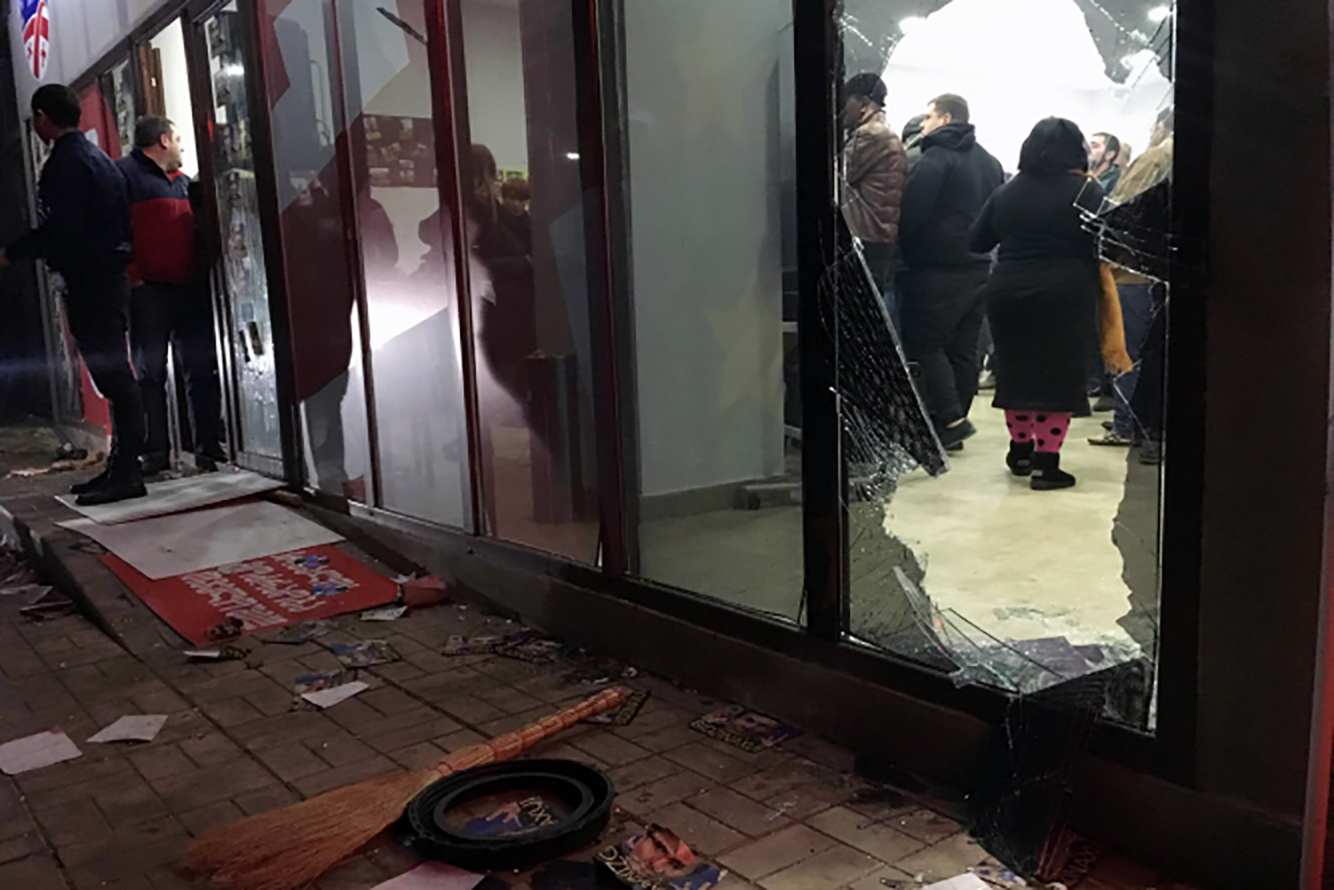
Violence in Mtskheta
The initial rally outside the mayor’s office in Mtskheta was held by young activists on 2 December.
They brought symbolic ‘41 pieces of silver’ (chocolate coins wrapped in silver foil) for Georgian Dream majoritarian MP Dimitri Khundadze.
Forty-one is the electoral number of the ruling party, while their silver colour was a biblical reference to Georgian Dream ‘betraying’ their promise to move to a fully proportional electoral system.
Khundadze was at the forefront in defending Georgian Dream for retracting their promise.
Several high-ranking Georgian Dream MPs left the party in protest over the decision.
[Read more on OC Media: More Georgian Dream MPs abandon party over electoral reform u-turn]
In video footage disseminated by anti-government group Gabede on their Facebook page, one member, Lasha Diarovi, is shown being thrown to the ground and kicked in the face.
The Interior Ministry said they had apprehended seven people for petty hooliganism following Monday’s clashes in Mtskheta — three Georgian Dream supporters and four members of Gabede.
Gabede protested the arrest of their members, who they said were ‘victims of violent attacks’. Another two of their members were hospitalised with non-life-threatening injuries.
Youth transported by Georgian Dream to Tbilisi attack activists
Following the clashes outside the mayor’s office in Mtskheta on 2 December, anti-government activists regrouped in the capital city. They gathered outside the ruling Georgian Dream’s office in downtown Tbilisi later that day to condemn the violence only to be confronted again by pro-government youth groups.
The ensuing skirmish resulted in several injuries — five, according to opposition activists. The Interior Ministry has so far made no arrests within their investigation of the incident.
Participants of the opposition rally — mobilised by the For Freedom, Shetsvale (Change!) and Gabede (Dare!) groups — claimed that the police stood by as oncoming Georgian Dream activists swore and attacked them without provocation.
In a video published on Facebook by Tamar Kakabadze, a member of the opposition European Georgia party, police are shown initially letting pro-government group approach protesters despite being asked not to let this happen.
Anti-government groups claimed that Georgian Dream mobilised students outside Tbilisi en masse and transported them to Tbilisi earlier that day to counter anti-government protests.
Georgian Dream’s youth groups announced the opening of ‘Youth Week’ on 2 December with a concert. They cited Georgia chairing the Committee of Ministers at the Council of Europe, something that commenced six days earlier, as the occasion.
The fact that, along with the concert, the violent forces (part of which came to attend the GD concert) physically and verbally assaulted the activists of #Shame and other movements, raises suspicions that the GD intentionally brought activists to disperse our peaceful protest.
— Shame Movement – For Freedom (@shamemovement) December 3, 2019
Georgian Dream’s youth wing invited thousands of young people from Kutaisi, Batumi, and other cities with universities to attend the concert at Tbilisi’s Orbeliani Square.
Although Georgian Dream leaders denied it was related to ongoing protests in Tbilisi, some groups later moved from the concert to their office to confront opposition activists.
After two recent large rallies aiming to blockade parliament in Tbilisi were broken up by riot police with water cannons, anti-government groups, supported by most of the country’s opposition parties, changed tactics to holding smaller demos targeting Georgian Dream MPs’ offices.
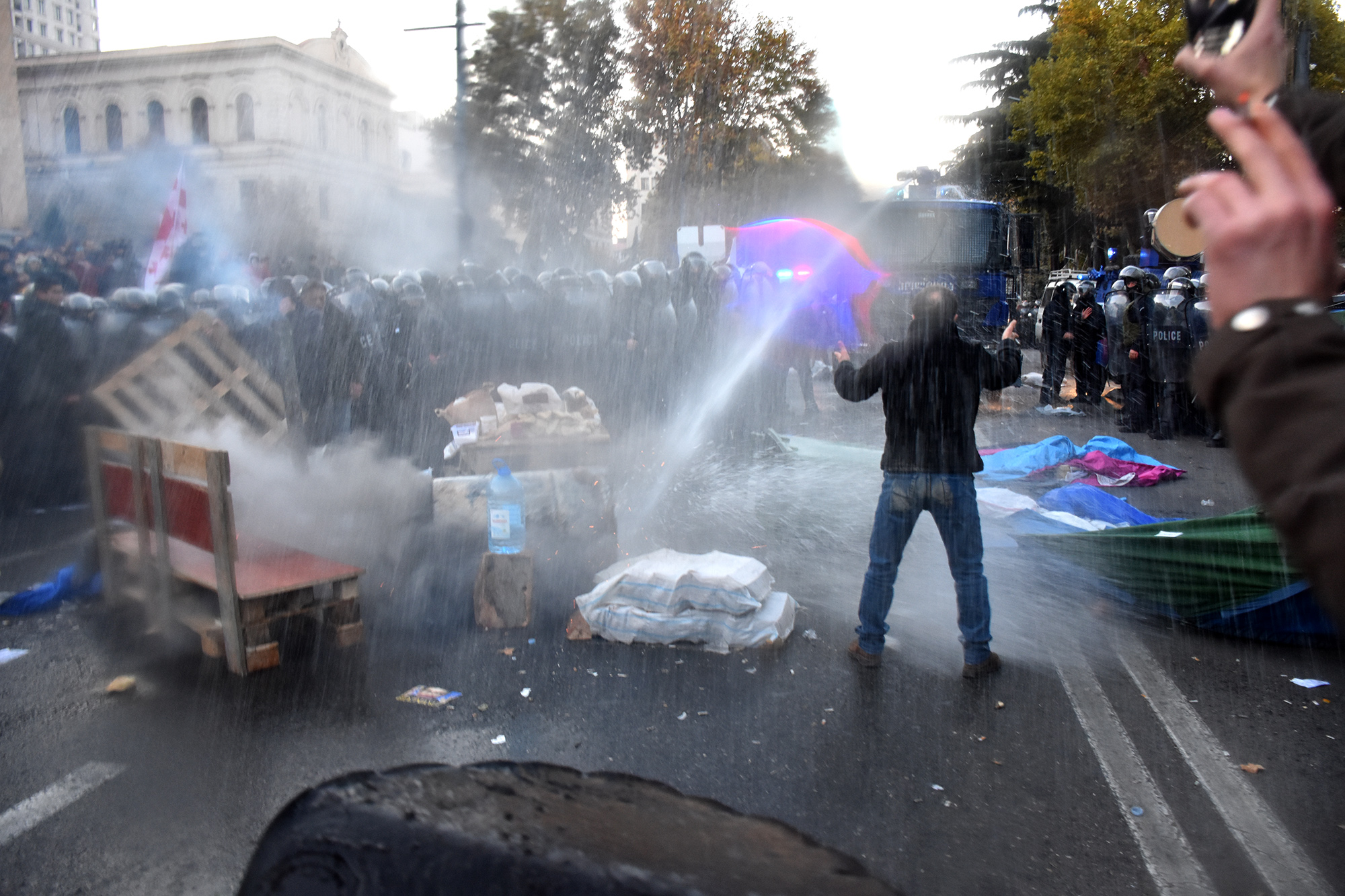
[Read more on OC Media: Tbilisi protests again dispersed by water cannon as Georgian Dream mulls switch to fully majoritarian system]
United opposition sends electoral reform bill to Venice Commission
Opposition parties are now demanding the government adopt a German electoral model after the ruling Georgian Dream party failed to pass promised electoral reforms.
In elections to the German Bundestag, voters cast two ballots, one to elect their local MP and another from a party list. Parties that win at least 5% of votes from the party lists are allocated seats in a way to ensure that the makeup of parliament is as proportional to the percentage of votes cast for each party as possible.
Several Georgian Dream MPs have said the 2020 parliamentary elections will be held with the current system, insisting the ‘German model’ contradicts the Georgian constitution.
The opposition has insisted otherwise, announcing they would send the bill to the OSCE Office for Democratic Institutions and Human Rights (ODIHR) to evaluate if it contradicts the Georgian constitution.
On 3 December, Georgian Public Defender Nino Lomjaria said she was ready to send the bill to OSCE/ODIHR once it is initiated in parliament, as required by the OSCE.
Opposition parties said they would introduce the bill within a few days.
‘We are ready to take into account whatever remarks the OSCE/ODIHR might have on our bill’, said the chair of opposition New Georgia party, Giorgi Vashadze.
On 30 November, Georgian Dream and opposition parties held negotiations together with the diplomats from partner countries in Tbilisi. However, no consensus was reached.



